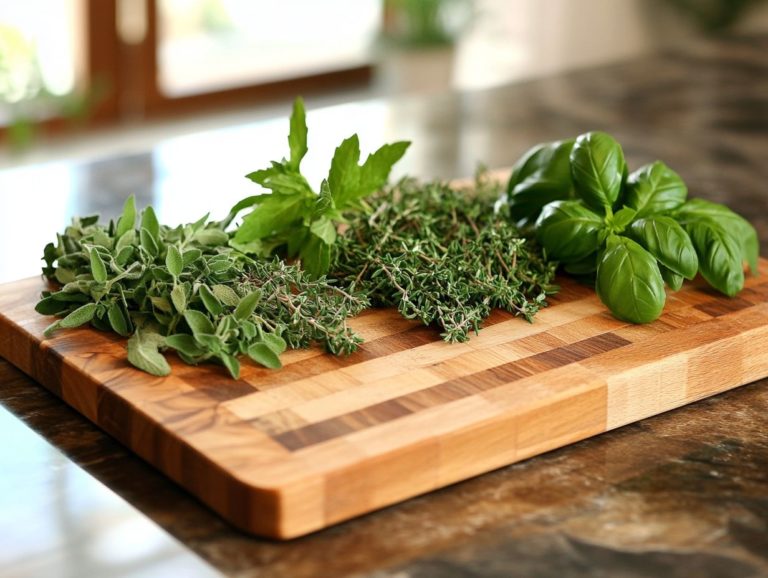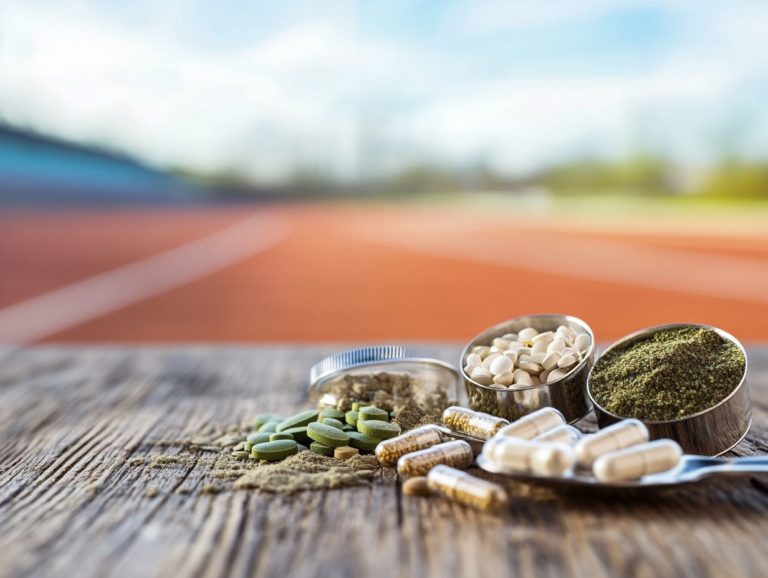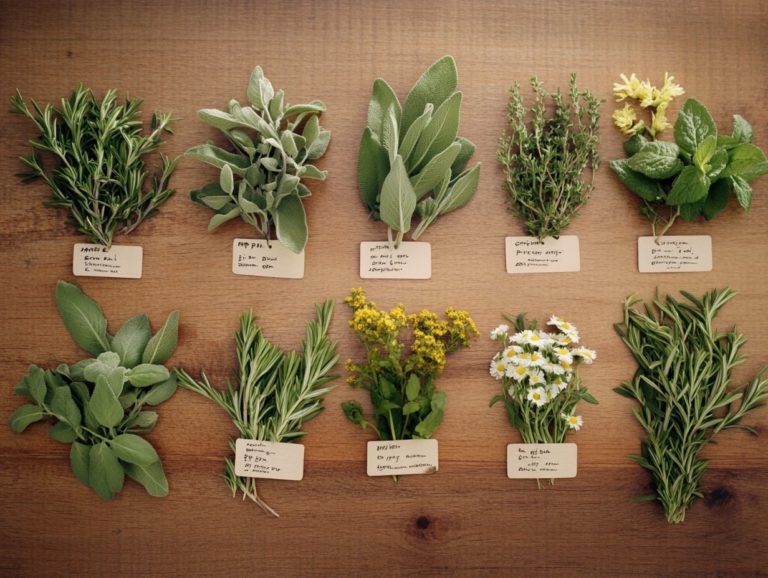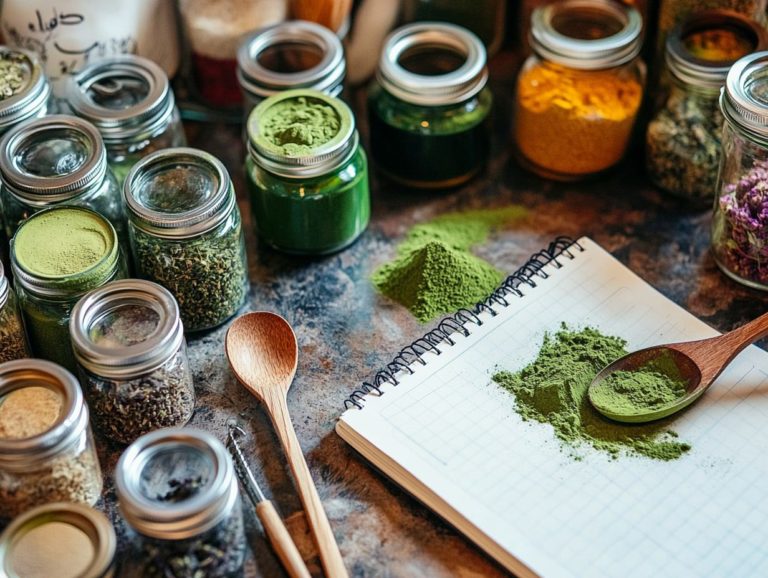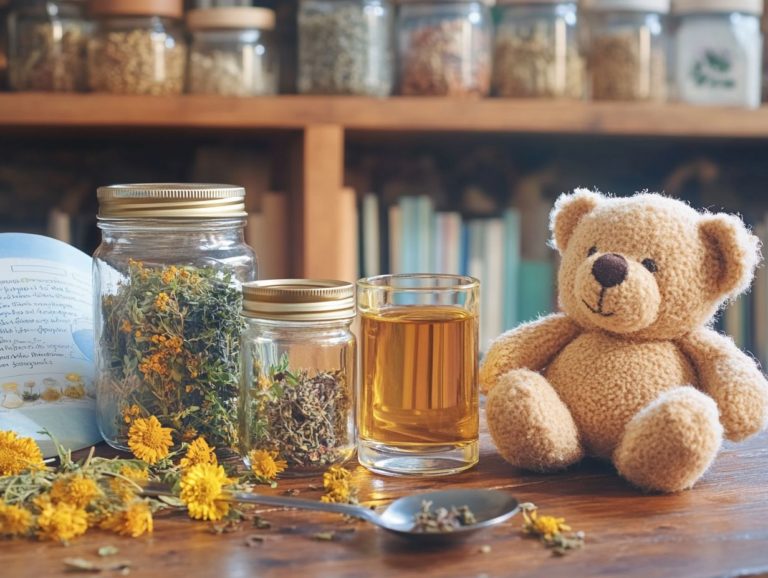Concentration Levels in Herbal Remedies: A Dosage Guide
Herbal remedies have become increasingly popular as natural alternatives for various health concerns, particularly within the realm of Chinese herbal medicine. Grasping their proper use is crucial for your well-being.
This article delves into what herbal remedies truly are and underscores the significance of dosage calculations for maximizing their health benefits. You’ll learn how to identify concentration levels of herbal extracts, interpret labels, and calculate the right dosages for common herbs.
Potential risks and side effects, including the toxic effects of certain ingredients, are also important to highlight. Practical tips for using these remedies safely and effectively will be provided. By the end, you’ll be excited to confidently navigate the world of herbal medicine and herbal therapy.
Contents
- Key Takeaways:
- Understanding Herbal Remedies and Dosage
- Determining Concentration Levels in Herbal Remedies
- Calculating Dosage for Herbal Remedies
- Potential Risks and Side Effects
- Tips for Safe and Effective Use of Herbal Remedies
- Frequently Asked Questions
- What are concentration levels in herbal remedies?
- Why is it important to know about concentration levels in herbal remedies?
- How are concentration levels measured in herbal remedies?
- Are there different concentration levels for different health concerns?
- Is there a standard concentration level for herbal remedies?
- What happens if I take too much of an herbal remedy with high concentration levels?
Key Takeaways:
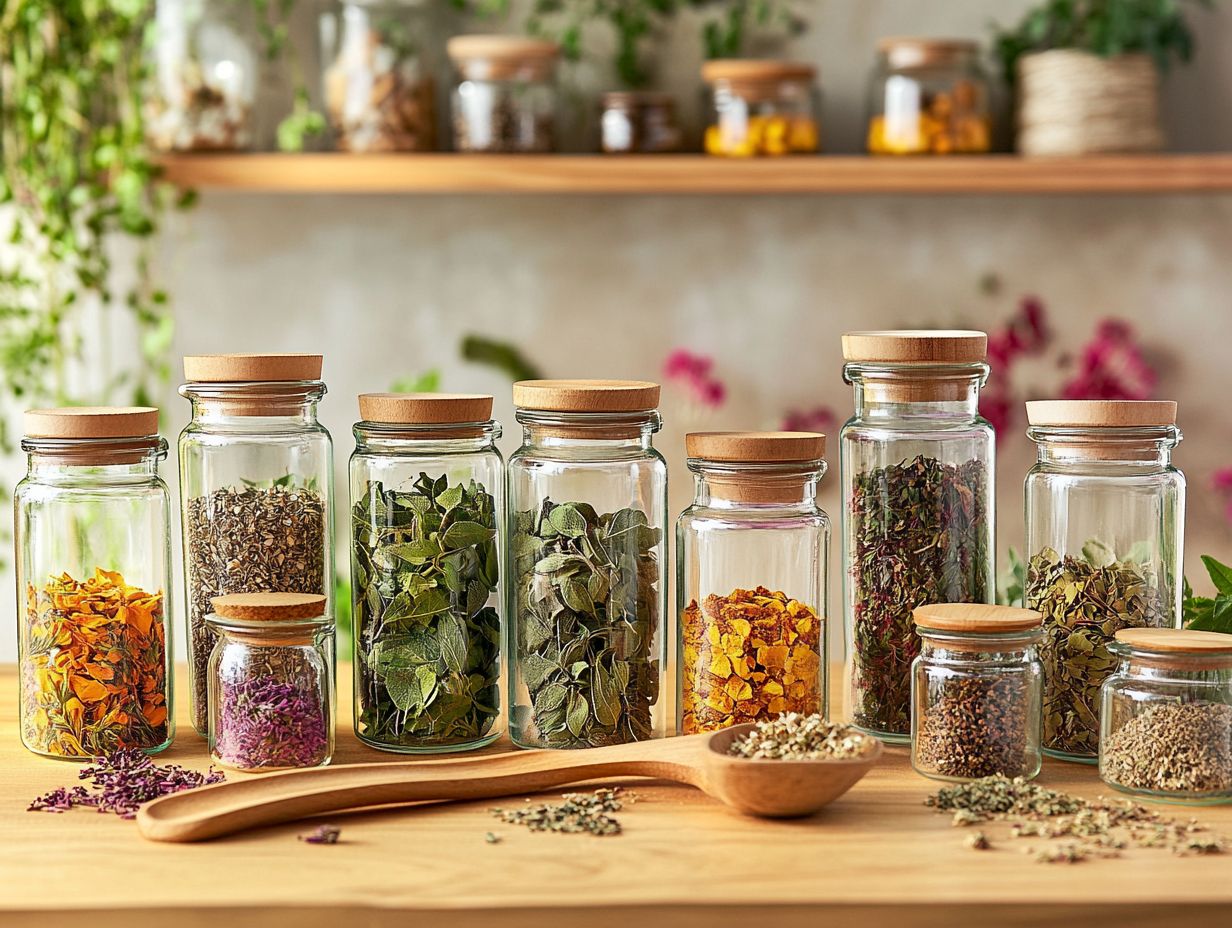
- Understanding and dosing herbal remedies is crucial for effectiveness and safety.
- Plant species, harvesting methods, and processing techniques can affect herbal concentrations.
- Always consult a healthcare professional and monitor your dosage to avoid risks.
Understanding Herbal Remedies and Dosage
Grasping the details of herbal remedies and their precise doses is essential for mastering Traditional Chinese Medicine (TCM).
This whole-person approach prioritizes personalized treatments sourced from a diverse array of medicinal herbs. It emphasizes the role of TCM practitioners while always keeping patient safety at the forefront.
As a practitioner of TCM, you harness the power of exact doses of concentrated extracts and carefully crafted herbal formulas. This ensures that health benefits are fully realized while minimizing any adverse effects. Relying on clinical prescriptions and meticulous dosage calculations, including the use of the Chinese Intelligence Prescription System (CIPS), is crucial in this endeavor. It allows for a bespoke approach tailored to each individual’s unique health requirements.
What are Herbal Remedies?
Herbal remedies encompass the use of plant-based substances designed to enhance your health and wellness, a practice deeply rooted in Traditional Chinese Medicine.
These remedies offer a rich variety of herbs, such as Panax ginseng for boosting energy, jujube for promoting relaxation, and Rheum rhabarbarum for aiding digestion. This highlights the remarkable potential of nature s pharmacy. In this framework, TCM practitioners serve as invaluable guides, helping you choose the right herbal treatments tailored specifically to your unique constitution and health needs.
This personalized approach emphasizes the importance of medicinal herbs not just as therapeutic agents but as essential elements of a balanced lifestyle that aligns with the principles of Traditional Chinese Medicine. The blend of ancient wisdom and modern practice showcases the timeless value of these herbal solutions, inviting you to explore their benefits for your well-being.
Why is Dosage Important?
Dosage plays a crucial role in herbal therapy, as it significantly influences both patient safety and the overall effectiveness of the treatment.
When you consider herbal remedies, precision in dosing becomes essential. Incorrect dosages can lead to not only reduced therapeutic effects but also potentially harmful consequences. These adverse reactions underscore the importance of meticulously managing herbal preparations, ensuring that you receive the intended benefits without compromising your health. For detailed guidelines, refer to herbal remedies: safe dosage for adults and children.
Each herb has its own unique properties, and the concentration of its active components can vary widely. Understanding the relationship between dosage and efficacy is key to achieving optimal therapeutic outcomes while minimizing risks, especially concerning adverse side effects. For pregnant women, following herbal dosage guidelines is crucial. Health professionals must prioritize accurate measurement and monitoring, emphasizing the vital importance of precision in herbal therapy.
Determining Concentration Levels in Herbal Remedies
Determining the concentration levels of herbal constituents in herbal remedies is crucial for ensuring both efficacy and safety. This factor significantly influences the potential health benefits and risks associated with herbal therapy. Understanding these concentrations helps you make informed decisions about your herbal treatments, maximizing their effectiveness while minimizing any potential risks, including those posed by toxic ingredients.
Factors Affecting Concentration
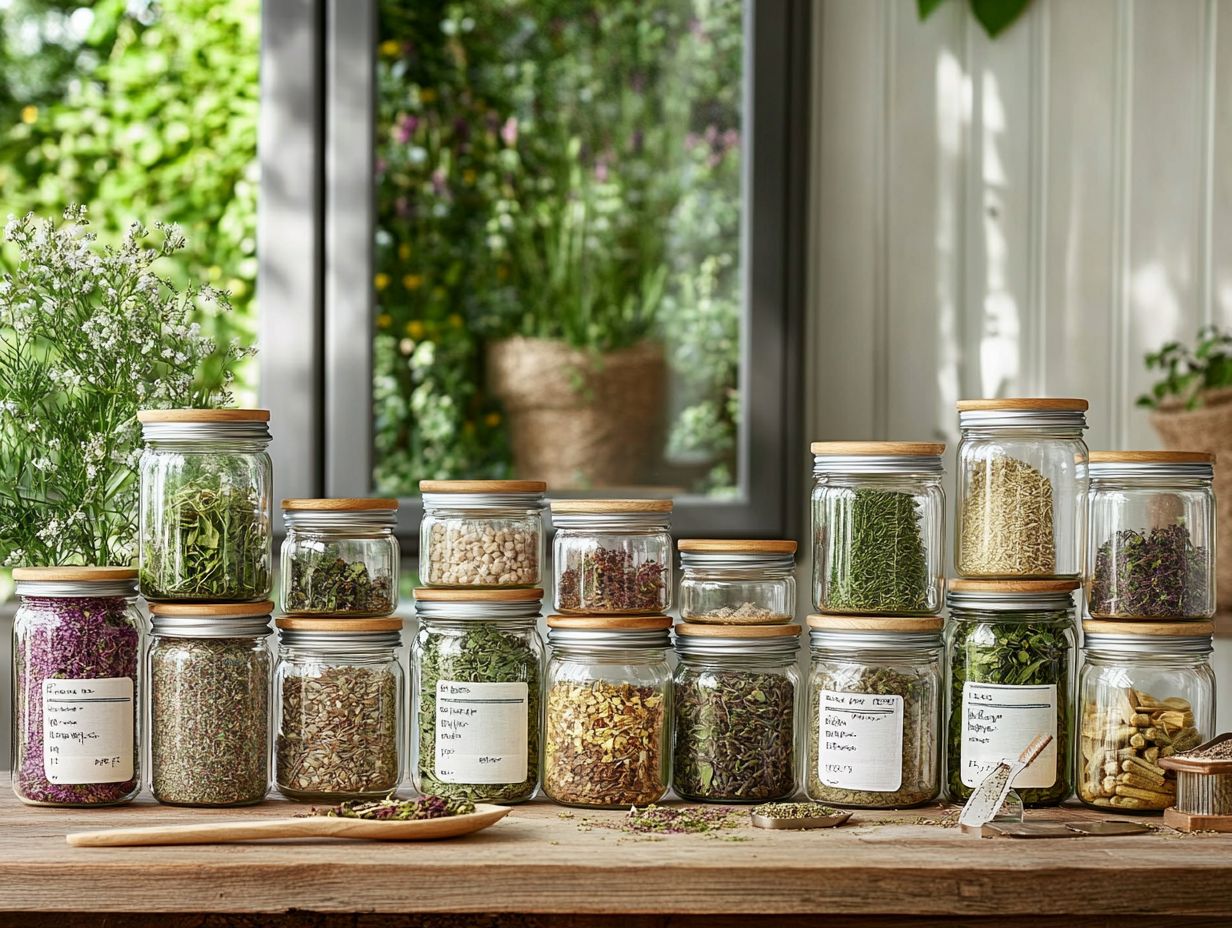
Several factors can significantly influence the concentration of herbal extracts used in remedies, ultimately affecting dosage calculations and patient safety.
The quality of your raw materials is paramount. Herbs sourced from various environments, especially those cultivated under good manufacturing practices, can produce differing potency levels.
The preparation methods you choose whether steam distillation or solvent extraction can greatly impact the final concentration of active compounds. This influences the overall toxic effects of the herbal remedy.
The storage conditions you maintain are critical for preserving the integrity of these extracts over time. Temperature, humidity, and light exposure play significant roles in this preservation.
As a practitioner, grasping these elements is essential as they directly correlate with the efficacy and safety of treatments. This highlights the necessity for meticulous attention to detail.
Interpreting Label Information
Interpreting the label information on herbal products is essential for grasping their concentration and ensuring safe usage.
Find clear dosage guidelines to ensure your safety and maximize the benefits of herbal remedies! For more detailed information, refer to our safety tips for creating herbal remedies. Pay close attention to the concentration levels indicated on the label, as these not only influence the potency of the product but also its potential interactions with other medications, including those outlined in the CIPS algorithm.
Being aware of the standard serving size, along with any warnings related to specific health conditions, empowers you to make informed choices. This careful approach helps mitigate adverse effects, including toxic effects, promotes your safety, and enhances the overall efficacy of herbal treatments. For more detailed information, consider exploring herbal supplements and recommended dosages.
Calculating Dosage for Herbal Remedies
Calculating the appropriate dosage for herbal remedies is an essential step in crafting effective clinical prescriptions that prioritize your patient safety. By ensuring precise dosages, you enhance the efficacy of the treatment while minimizing potential risks.
Dosage Guidelines for Common Herbs
Dosage guidelines for common herbs, including compound herbal formulas such as Chia-Wei-Hsiao-Yao-San and Ma-Zi-Ren-Wan, are essential for you as a practitioner to ensure the safe and effective use of Chinese herbal medicine.
Understanding the appropriate quantities can significantly influence patient outcomes, enabling you to customize each treatment to meet individual needs. For example, Ginseng, renowned for its energy-boosting and immune-supporting properties, is typically prescribed in dosages ranging from 1 to 3 grams per day. Additionally, the role of body weight in herbal dosage should be considered for accurate recommendations. Dang Gui, celebrated for its blood-nourishing benefits, often comes with a recommended dosage of 6 to 12 grams.
By skillfully incorporating these herbs into your clinical prescriptions with precise guidance, such as using the Chinese Intelligence Prescription System, you can elevate the therapeutic potential of your treatments while placing patient safety at the forefront. Start applying these guidelines today for safer and more effective herbal treatments!
Adjusting Dosage for Different Forms of Herbal Remedies
Adjusting the dosage of different herbal remedies is crucial for maximizing their therapeutic potential while ensuring your safety, particularly when considering concentrated extracts versus whole herbs.
It’s important to understand the differences between concentrated extracts and whole herbs. Each form has unique properties that require careful consideration. Concentrated extracts are typically more potent, which means you may need smaller doses to stay within a safe therapeutic range. For a deeper understanding of this topic, consider exploring understanding herbal dosage. In contrast, whole herbs are milder, allowing for larger doses, but they can still pose risks if consumed excessively.
As a practitioner, evaluate these individual forms and suggest tailored adjustments. Consider any toxic ingredients that may affect your health conditions. Additionally, be aware of 5 common herbal dosage mistakes to avoid. This method helps you use herbal supplements safely and effectively.
Potential Risks and Side Effects
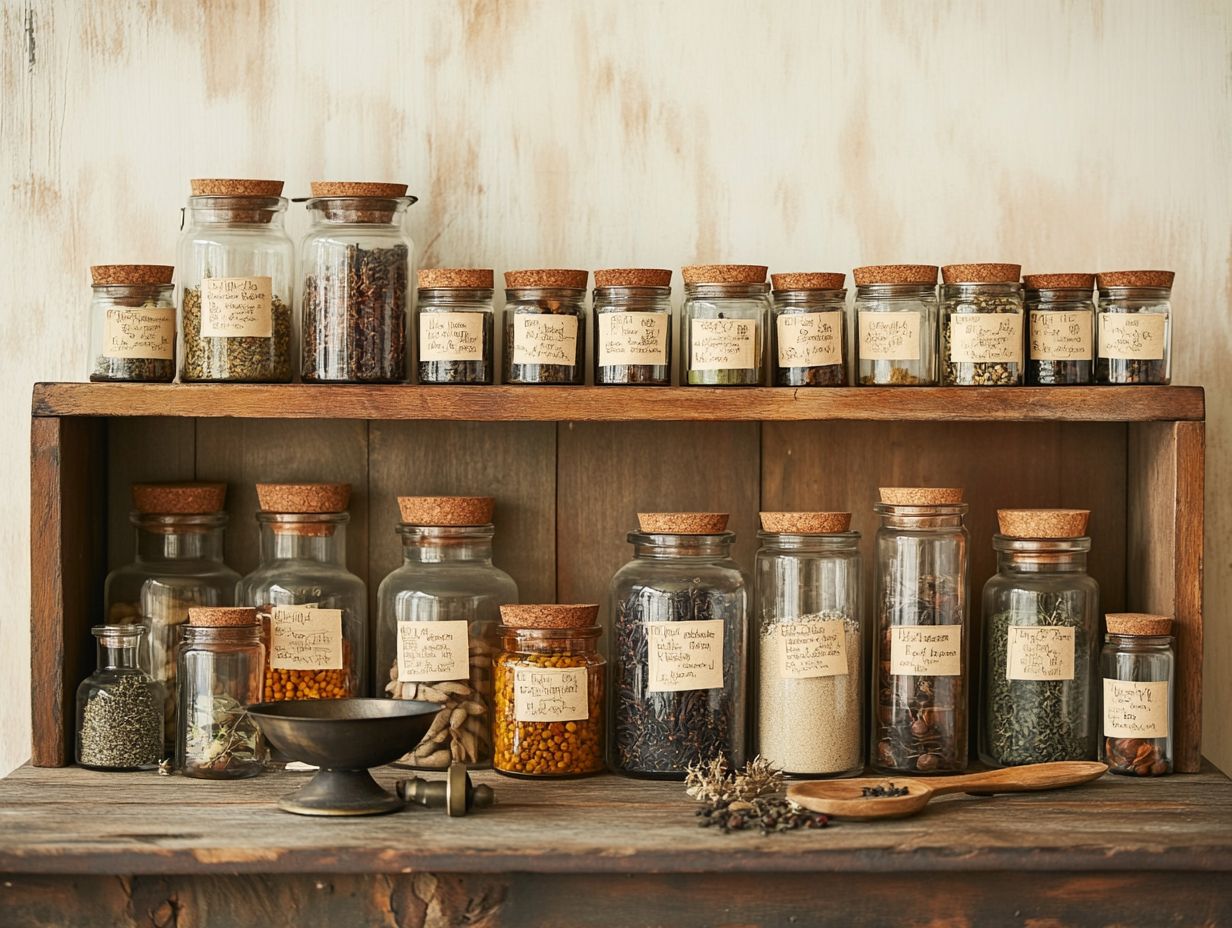
Recognizing the potential risks and side effects of herbal remedies, including negative effects, is essential for ensuring patient safety and enhancing treatment outcomes. Being informed allows you to make educated decisions that prioritize well-being while maximizing the effectiveness of your chosen therapies.
Understanding the Risks of Incorrect Dosage
Incorrect dosages of herbal remedies pose significant risks that can compromise your safety.
Consider the overdose of herbal supplements like kava, which has been linked to liver damage. This highlights the importance of following dosage calculations, such as those derived from the CIPS algorithm. For accurate measurements, it’s crucial to learn how to measure herbal dosages accurately. Using goldenseal improperly can result in serious side effects, such as gastrointestinal distress and harmful interactions with pharmaceutical medications.
The tragic case of a patient who ingested excessive amounts of the herbal stimulant ephedra serves as a stark reminder of severe health complications that can arise from miscalculating dosages, including heart palpitations and even life-threatening situations.
Practitioners and patients must understand the dangers of incorrect dosages. This knowledge is crucial for safe and effective treatments.
Common Side Effects of Herbal Remedies
Common side effects of herbal remedies can vary significantly, and understanding them is essential for your safety.
Many people often miss the possible side effects that can accompany these natural products. You might experience gastrointestinal disturbances, such as nausea or diarrhea, especially if taking excessive amounts. Some herbs can interact with medications, leading to unwanted complications. For example, St. John’s Wort may diminish the effectiveness of antidepressants. Others, like kava, have been associated with severe liver damage, highlighting the critical need to scrutinize the ingredients.
Being aware of these risks gives you the power to make informed choices about your health.
Tips for Safe and Effective Use of Herbal Remedies
Utilizing strategies for the safe and effective use of herbal remedies can greatly improve your treatment outcomes while reducing potential risks.
Consulting with a Healthcare Professional
Always consult a healthcare professional before using herbal remedies. This proactive approach ensures you receive personalized advice tailored to your unique health conditions and any potential interactions with existing medications.
With countless options available, navigating the intricate world of herbal treatments can feel overwhelming. A qualified practitioner can shed light on dosage recommendations for popular herbs, taking into account factors such as dosage, preparation methods, and your specific health goals.
Prioritizing your safety is crucial. Making informed decisions can significantly reduce risks and enhance the therapeutic benefits of the remedies you choose. For those interested in using herbal teas, understanding the proper dosage for herbal teas is essential. Seeking professional guidance helps you effectively and securely integrate natural solutions into your wellness routine.
Monitoring and Adjusting Dosage as Needed
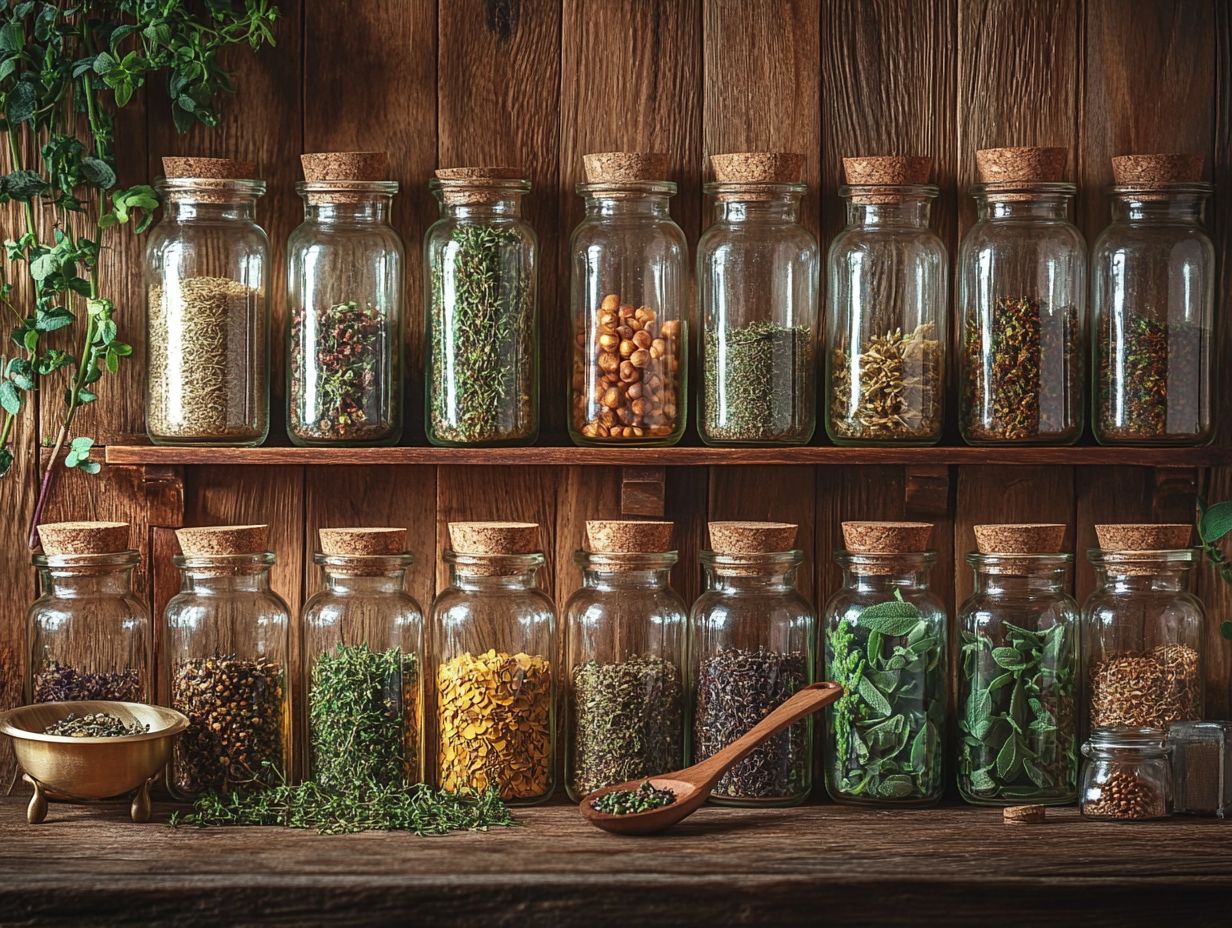
Monitoring and adjusting dosage is essential for ensuring the effectiveness and safety of herbal remedies.
This ongoing process requires careful observation of how people respond to treatments. Feedback about symptom relief and potential side effects is crucial.
Be attentive to each patient s unique biological makeup and health history. These factors can significantly influence reactions to specific herbs.
Maintain open lines of communication to make timely dosage adjustments. This personalized approach boosts therapeutic results and keeps side effects at bay!
Frequently Asked Questions
What are concentration levels in herbal remedies?
Concentration levels indicate the amount of active ingredients in a product. This amount varies based on the type of herb and extraction method.
Why is it important to know about concentration levels in herbal remedies?
Understanding concentration levels helps determine the right dosage and effectiveness of a remedy. It also aids in avoiding potential side effects and drug interactions.
How are concentration levels measured in herbal remedies?
Concentration levels are usually measured in milligrams (mg) or percentages (%). This information can often be found on the product label or obtained from the manufacturer.
Are there different concentration levels for different health concerns?
Yes, different herbs have varying concentration levels for specific health issues. It s vital to consult a healthcare professional or conduct research for your needs.
Is there a standard concentration level for herbal remedies?
No, concentration levels vary greatly depending on the herb and extraction method. Always read product labels carefully and consult a professional for proper dosing.
What happens if I take too much of an herbal remedy with high concentration levels?
Taking too much of a highly concentrated herbal remedy may lead to side effects like nausea, vomiting, or allergic reactions. Always follow recommended dosages and consult a healthcare professional if negative effects occur.

